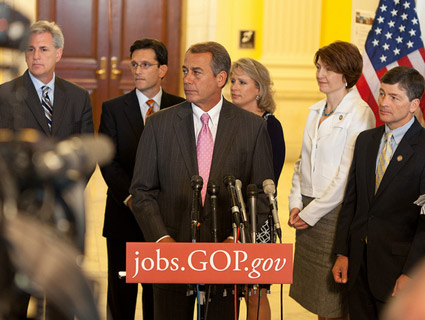By now, it’s straight-up GOP dogma: President Obama’s government regulation jihad kills jobs. Prominent Republicans—including Majority Leader Eric Cantor (R-Virg.), Speaker John Boehner (R-Ohio), and not-a-class warrior Rep. Paul Ryan (R-Wisc.)—rail incessantly against the climate of “uncertainty” these rules on environmental and worker safety create for businesses, insisting that regulations prevent companies from investing in new hires.
Former Reagan and George H.W. Bush budget official Bruce Bartlett digs through data from the Bureau on Labor Statistics to prove none of that is actually true:  Not only does the overall percentage of layoffs due to regulations barely register in the data. The number of layoffs attributed to government regulations has decreased since President Obama took office.
Not only does the overall percentage of layoffs due to regulations barely register in the data. The number of layoffs attributed to government regulations has decreased since President Obama took office.
Barlett also draws on reams of anecdotal evidence that points at the chief cause of layoffs over the past three years—shrinking demand:
During June and July, Small Business Majority asked 1,257 small-business owners to name the two biggest problems they face. Only 13 percent listed government regulation as one of them. Almost half said their biggest problem was uncertainty about the future course of the economy—another way of saying a lack of customers and sales.
The Wall Street Journal’s July survey of business economists found, “The main reason U.S. companies are reluctant to step up hiring is scant demand, rather than uncertainty over government policies, according to a majority of economists.”
In August, McClatchy Newspapers canvassed small businesses, asking them if regulation was a big problem. It could find no evidence that this was the case.
“None of the business owners complained about regulation in their particular industries, and most seemed to welcome it,” McClatchy reported. “Some pointed to the lack of regulation in mortgage lending as a principal cause of the financial crisis that brought about the Great Recession of 2007-9 and its grim aftermath.”
The latest monthly survey of its members by the National Federation of Independent Business shows that poor sales are far and away their biggest problem. While concerns about regulation have risen during the Obama administration, they are about the same now as they were during Ronald Reagan’s administration, according to an analysis of the federation’s data by the Economic Policy Institute….
Unemployment is much higher in those industries that one would expect to suffer most from a lack of aggregate demand: construction, leisure and hospitality, business services, wholesale and retail trade, and durable goods.
Just to be clear, then: There is no substantial evidence to support the assertion that government regulations are holding back the economy. As Kevin Drum wrote recently, “[b]usiness owners may not like new rules (who does?), but their real problem is a lack of customers. That’s something we could go a long way toward fixing if we really wanted to.”









